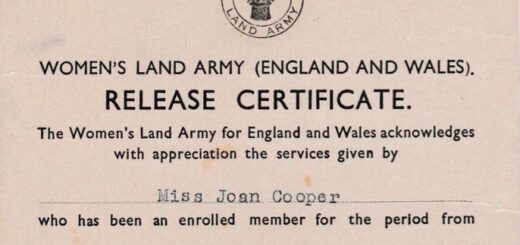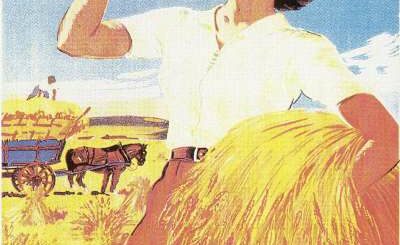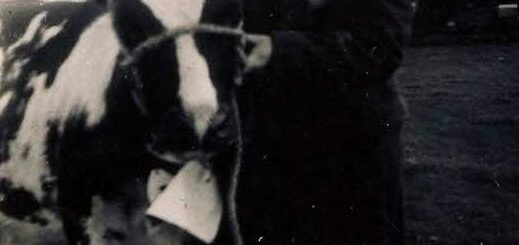Iris Marie Newbould (née Faulkner)
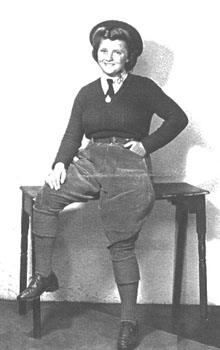
Source: BBC WW2 People’s War
“I was 14 when war was declared. I had left school and was working in a shop in Hull.
Over the next three years I saw many changes. Food became scarce and rationing was introduced. I helped to pack food boxes for troops and was trained to deal with ration books and shortages. At 16 I was searching the rubble of our home for personal treasures. A landmine bomb had hit our street. We then lived for a time in the local Church and slept on the floor until a house was found for us. My mother, father and baby sister enjoyed having a roof over our heads once again.
At 17 1⁄2 I volunteered for the Land Army to help grow food for our country. 87,000 girls joined up to “Dig For Victory”. We wore a uniform of corduroy breeches, green pullover, brown shoes and a light brown felt hat. Our working gear was denim overalls and jackets, heavy boots and gaiters, or rubber Wellingtons.
I spent 3 winters threshing with a hired team and machinery. The rest of the time I was working on a dairy farm. We learnt to milk 12 cows by hand every morning starting a 6am, breakfast was at 8am. We helped with lambing, cleaning out hen huts, fold yards and stables. Harvest was done the old way. No machinery, just horses and men. Later on a few tractors were supplied and the steam engines which drove the threshing machines were gradually replaced by tractors. I sometimes worked with Italian prisoners who were billeted at Eden Camp, Malton.
We enjoyed our time off at village dances. We became very fit and strong. We had to cycle to work, sometimes as much as 12 miles from our billet. We washed by candle light and had a bath once a week, in a tin bath in the garden shed. The water came in a bucket from a fire heated copper. There was no electricity in our village until after the war.
I enjoyed my days in the Land Army and learned to be self reliant and patient. The friends I made are still around and we enjoy reunions.”
Source: BBC WW2 People’s War
You can read a longer account written by Iris here.
General Information
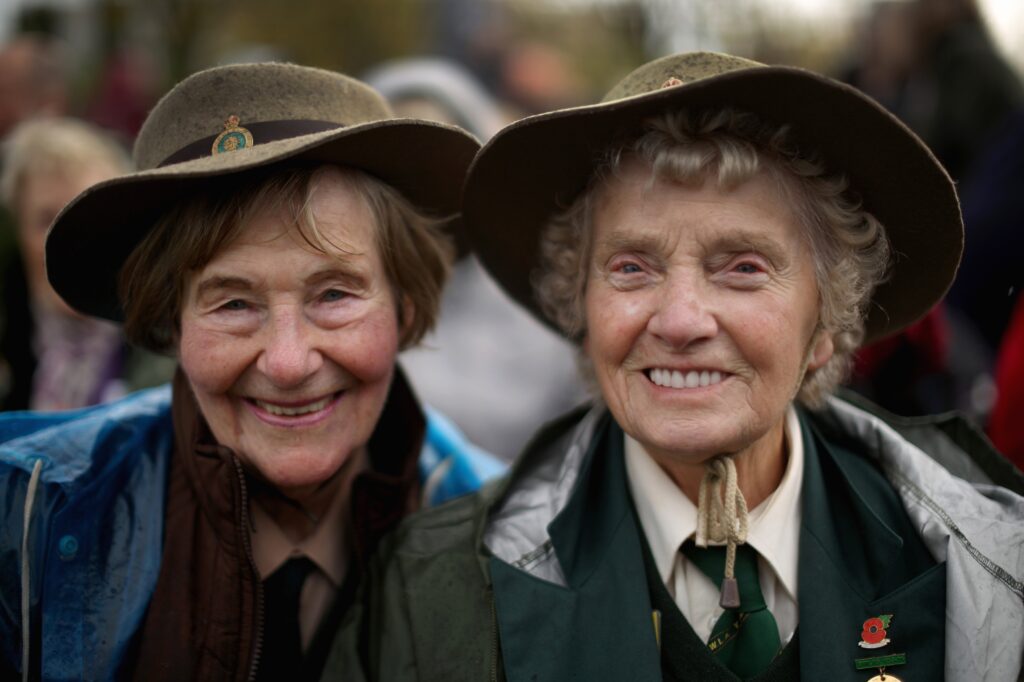
Source: Christopher Furlong, Getty Images.
First Name(s): Iris Marie
Unmarried Surname: Faulkner
Married Surname: Newbould
Date of Birth: 17.5.1925
Place of Birth: Leeds, Yorkshire
Date Joined WLA: February 1942
Date Left WLA: February 1945
WLA Number: 105,506
Pre-war occupation: Shop Manager
Reasons for joining: I wanted to grow food during food shortage.
Family’s reaction to joining: My father warned me I would have to do a man’s work and it would be a hard life, but gave me his blessing and permission.
Reactions of local people towards WLA: Mainly good – occasionally village girls would resent us ‘Townies’ when we went on dates with the village boys, (too much competition).
Treatment by farmers and market gardeners: Very good generally.
Reasons for leaving: Health problems.
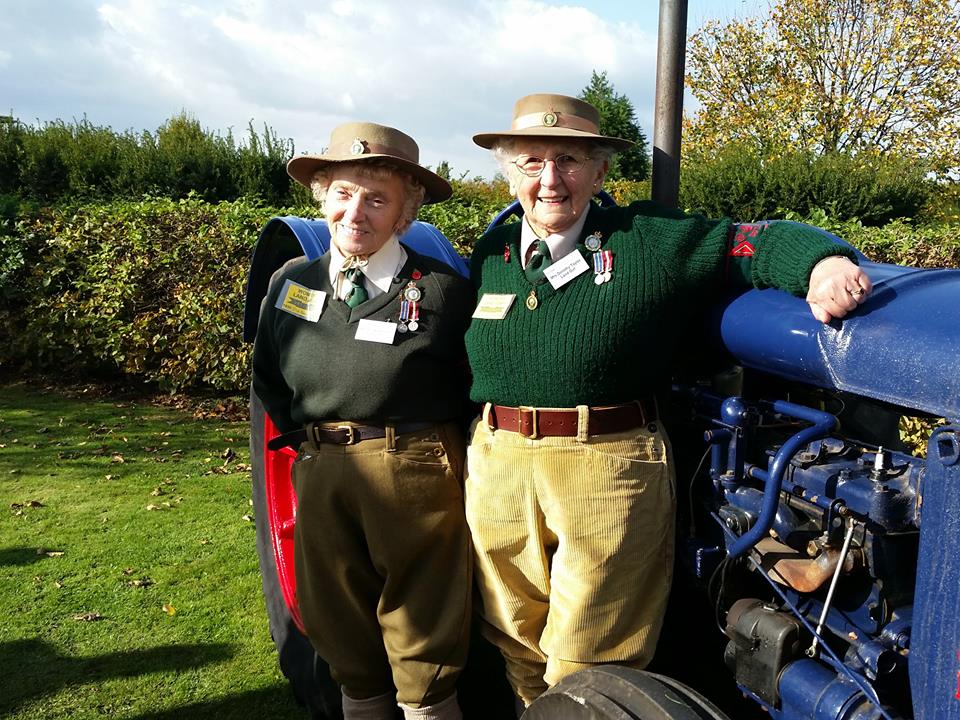
Employment and Accommodation
Employment
Pre-Work Training: Yes – 1 weekend training farm, threshing and field work.
Employed by?: Private farmer, Ralph Yates, Malton. Hired 2 Land Girls to follow the threshing machine within a 12 mile radius of Malton on bicycles from September to March.
Dates with employer?: January 1942 – January 1945
Farm Name: George Elliot – ‘Grimston Fields’, Langton, North Grimston, Yorkshire
Later transferred to North Dalton and Huggate, working for Jim Barrett, Bainton. Hired 2 Land Girls, full season tramp threshing 12 mile radius of billet, September to March. Worked with Edna Scott.
Carried out:
- General farming
- Cleaning out stables and chicken houses, cow barns etc.
- Milking cows and goats by hand.
- Tending sheep, (digging and feeding).
Dairy farming and field work were enjoyable. ‘Tramp Threshing’ was a daily job, dirty and hard work.
Any accidents or injuries:
I fell off a horse, causing bad cuts and bruising.
Chest and breathing discomfort while mixing pink powder fertilizer – no mask available.
Accommodation
Lived in farmworker’s cottage with Maud and Isaac Bradley, Langton, Malton, Yorkshire.
Life After War
Returned to pre-war occupation of Shop Manager.
How did work in the WLA effect your life? I enjoyed country life until back injury forced me to give up heavy work.
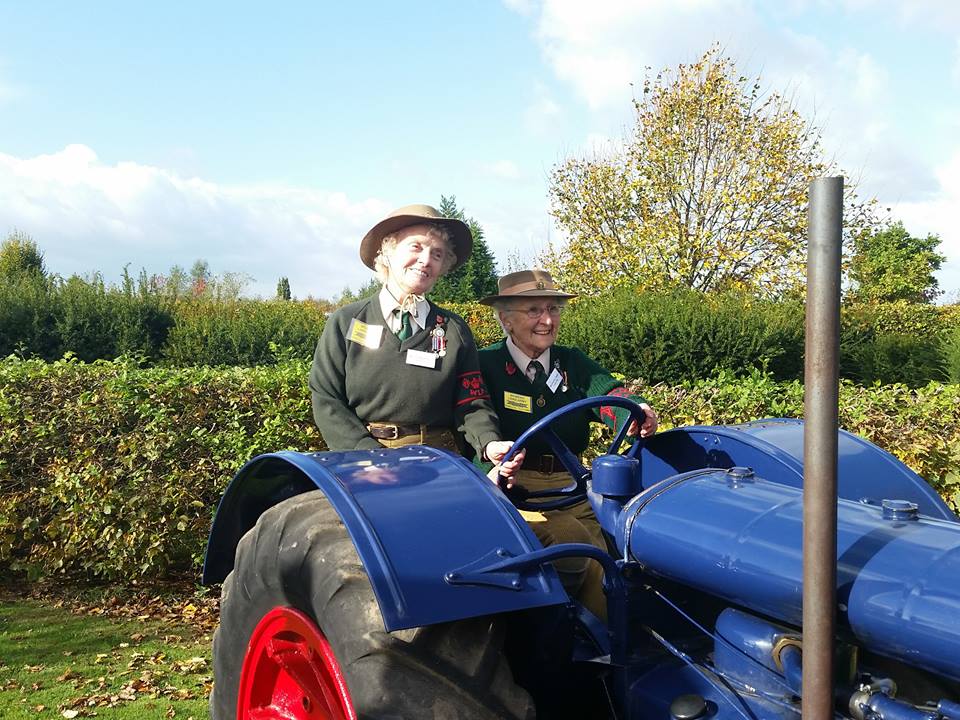
Further Information
Best and worst memories of time: Best times summer in the fields, singing as I worked with one other Land Girl, Edna Scott. Learning to stack hay and straw. Worst was daily threshing.
Opportunities to meet other Land Girls? Usually in Malton Town at weekends when we attended ballroom dances at ‘Milton Rooms’ and also the cinema.
Any outstanding events or achievements in WLA / WTC or in later life:
- As a WLA veteran I have done around 50 talks – local schools.
- Represented the WLA at different shows.
- Alan Titchmarsh Show – ITV 28.10.2014
- In November 2014 Armistice WLA display in ‘Street Life Museum’.
Any other comments on time in the WLA / WTC: The time spent in the WLA made me a better person and made me appreciate what I had.
Contributor Details
Name: Iris Newbould
